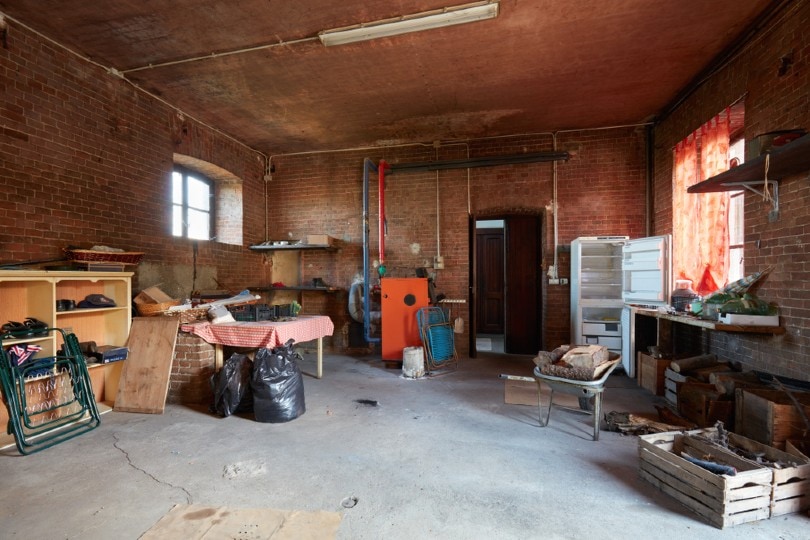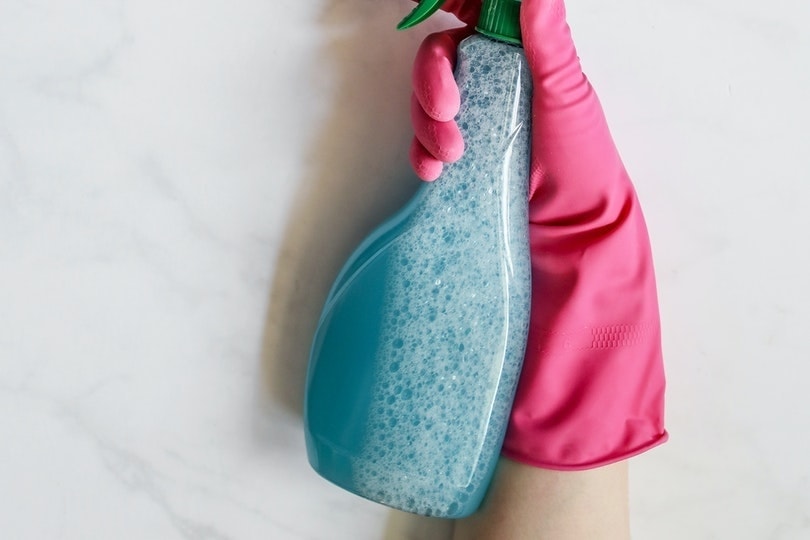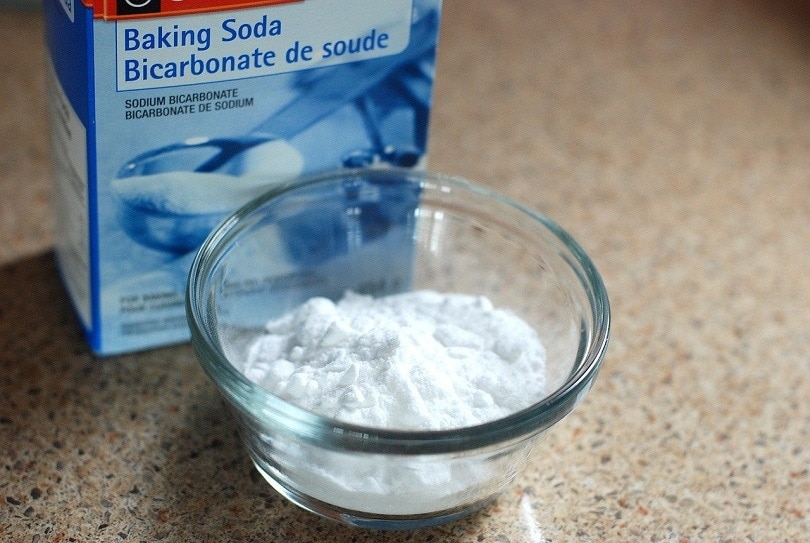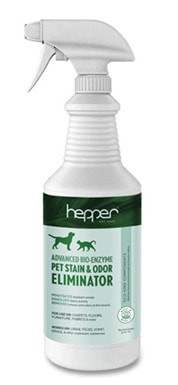How to Get Rid of Cat Urine Smells in a Basement (4 Practical Options)
-
Pete Ortiz
- Last updated:

Basements are the ideal place for cats to urinate because they are dark and often cool. The cat feels comfortable in this environment, unaware of the damage its urine is causing to your flooring.
If you’re a cat owner, no doubt you’ve come across an unpleasant surprise in your basement. Cats are notoriously finicky creatures. Usually, they will use the most inconvenient places to urinate. They find somewhere dark and low-lit.
There are several different methods you can try out. Not every method works for everyone, and some of these methods are more effective than others. Here are the four practical options for you.
Before You Start
First, you will need to locate the cat’s urine. A black light will come in handy. Turn off all other lights in your basement and turn on the black light. If there is cat urine anywhere in the room, it will glow bright green when you shine the light on it. It makes it easier to find, especially if you have a large carpeted space or many corners in your basement.
One thing that will help you to clean the stains and odor is a strong vacuum. Start by removing any debris, dust, and dirt.
Also, you need a pair of disposable gloves and a mask. You may also want to use eye protection. Cleaning your basement can be a dusty job. So, it’s crucial to protect yourself. And if you have allergies or health conditions, you need to be extra careful with the chemicals.
If you are not sure about the gloves and mask, there is no harm in wearing them.
The 4 Options for Getting Rid of Cat Urine Smell in a Basement
Now, you have the safety gear needed, and you’ve located cat urine in your basement. It’s time to dive in and look at several methods you can use to get rid of the smell.
1. Using Tri-Sodium Phosphate (TSP)
TSP is an extra-strength cleaner designed to remove heavy deposits of grease, dirt, and grime. It is an excellent remedy for getting rid of cat urine smells in a basement. It will also disinfect the area.
- Tri-sodium phosphate
- Hot water
- Bucket
- Safety glasses
- Rubber gloves
- Bristled brush
- Wet vac
- Put on rubber gloves and safety glasses to protect yourself from any TSP splashes or dust.
- Mix 1/3 cup of TSP in one gallon of warm water. It will be enough to clean three square feet of flooring.
- Add more water if needed to cover larger areas.
- Apply the cleaning solution with a sponge or bristle brush. Scrub well over stains and problem areas where cat urine smells are strongest.
The only drawback to using TSP is that it’s corrosive and can cause damage to some types of carpeting, flooring, and countertops. So, test it out in a small area before applying it more.
As soon as you’ve completed cleaning using Trisodium Phosphate, you’ll be left behind with uric acid crystals. Clean them off using enzymatic pet odor remover.
You should also keep the area well ventilated and make sure to keep children and pets out of the vicinity while you work.
2. Using Enzymatic Cleaner

If your cat has urinated on the floor of your basement, you can use an enzymatic cleaner to get rid of the urine smell.
Enzymatic cleaners use bacteria-eating enzymes to break down the strong ammonia smell of cat urine. It also breaks the waste proteins in the urine into odorless components. These products will remove unwanted cat urine smells from your flooring in only a few cleaning applications.
Enzymatic cleaners are not harmful. They are available at most pet stores and are inexpensive compared to other cleaners.
- Enzymatic cleaner
- A bucket
- Vacuum cleaner
- Warm water
- Dish soap
- Wear eye protection, a face mask, and rubber gloves.
- Vacuum the basement floor and clean any surfaces with warm water and dish soap to remove dirt and grime. Remove soiled towels from the basement immediately for washing or disposal.
- Test the enzymatic cleaner on an inconspicuous area of the basement floor in case it discolors or damages it in any way.
- Pour the enzymatic cleaner onto the affected areas of your basement floors and walls.
- Allow at least 24 hours for the enzymatic cleaner to work before applying another coat of it. But, do not exceed 48 hours between treating a urine stain with an enzymatic cleaner and cleaning over it again. It’s because it can cause dried urine crystals to become airborne and intensify the urine odor instead of removing it permanently.
It’s crucial to use enzymatic cleaners immediately after wiping up any visible signs of urine. Enzymatic cleaners will not be effective if the urine has already dried. They need to come into contact with liquid stains or fresh cat urine.
There are many enzymatic cleaners on the market that you can use. It’s a matter of what you’re comfortable with. You want to choose one that’s safe for your flooring, safe for your pets, and, most importantly, safe for the environment.
Are you looking for an enzyme cleaner that can keep your house clean and your pet happy? We recommend the Hepper Advanced Bio-Enzyme Pet Stain & Odor Eliminator Spray, which permanently gets rid of the most stubborn stains and smells. There’s even a 100% satisfaction guarantee so you can try this cleaner risk-free! Click here to order your first bottle.
At House Grail, we’ve admired Hepper for many years, and decided to take a controlling ownership interest so that we could benefit from the outstanding products of this cool cat company!
3. Using Baking Soda

Commercial products are available for removing cat urine odors from a basement. But a simple baking soda solution is more cost-effective and efficient in removing the odors. It works by absorbing moisture and neutralizing odors at their source.
- Baking soda
- Water
- Vacuum cleaner
- Clean the area where your cat has urinated before applying baking soda. It will help prevent further accidents. For synthetic material, use a mixture of a cup white vinegar and water. For natural materials like wood or stone, use hydrogen peroxide.
- Wash the spot with soapy water thoroughly. It’ll get rid of all traces of urine.
- Then, rinse with clean water.
- Sprinkle baking soda over the affected area and let it sit overnight.
- The next day, vacuum up the baking soda.
- If you can still smell urine in the basement, repeat this process until you don’t smell anything anymore.
Baking soda can irritate people who have asthma or other lung diseases. So, make sure you protect yourself by wearing gloves and a mask. This way, you won’t breathe in any particles that might be floating up into the air.
4. Using Positive-Ion Cleaners
All concrete floors are porous. It means that urine can soak into the concrete and cause permanent damage or staining. You need an industrial-strength cleaner made with positive ions to remove cat urine odors in a basement with concrete floors.
The positive ions work by breaking down the chemical bonds of the urine molecules. It removes the odor and stain at the same time. You can buy a positive-ion cleaner from a pet store or an online retailer.
- Positive-ion cleaner
- Vacuum cleaner
- Clean up any surface stains. If the cat’s urine has dried, use an enzymatic cleaner to break down the uric acid found in pet urine.
- Moisten the spot with water. The water allows the positive ions to penetrate deeper into porous surfaces such as concrete, drywall, and wood.
- Spray the positive-ion cleaner directly on the stain and surrounding areas.
- Allow the cleaner to soak into the flooring for an hour or longer if possible.
- Use a wet or dry vacuum to remove excess moisture from your basement flooring.
- Spray a fresh coat of positive-ion cleaner over each cleaned area after it has dried completely.
Positive-ion cleaner bonds with the negative ions in the cat urine and eliminates the odor.
Take care to scrub down the entire area so that the positive-ion cleaner will have the best chance possible at removing odors.
General Advice
- Ensure you read the instructions on any cleaning or cat urine odor removers you buy.
- Don’t use bleaches when cleaning.
- Clean the entire basement floor, not only where the cat urine stain is.
- Don’t use ammonia-based cleaners. It’s because cat urine contains ammonia. So, ammonia-based cleaners will make the smells stronger. Also, the cat may come back and urinate on the same spot.
Why Won’t Normal Cleaning Get Rid of Cat Urine Odors?
Ordinary cleaning won’t remove cat urine odors completely. It’s not like dog urine, which is a water-soluble liquid. Cat urine is composed of solids, acids, and salts.
Usually, it’s yellow or orange, but can also be clear. You smell cat urine when the chemicals present are exposed to the air.
Cat urine is composed of different organic molecules. One of them is urea which breaks down into ammonia and carbon dioxide.
If you’ve ever smelled ammonia, you know it has a potent odor. When your cat urinates on something, the urea begins to break down into ammonia over time.
The longer the urine is left to sit in one place, the more these compounds break down into odorous compounds. Getting rid of the odors with ordinary cleaning will be impossible.
The cat urine smell isn’t only unpleasant for you. It can also encourage your cat to pee in the same spot again! Cats have a keen sense of smell. If they can still smell their urine, they may think that spot is acceptable for future use.
Conclusion
Removing cat urine smells from a basement is possible. You don’t have to panic if your cat decides to use your basement as a litter box. There are several effective solutions for cleaning the urine and getting rid of the odor.
Best of all, many of these options don’t involve toxic chemicals or spending large amounts of money. They’ll restore your basement to a space in which you can enjoy time with your pet.
The best way to get rid of urine smell is to use a cleaning product that contains enzymes or bacteria. It will be the most effective and efficient way to solve this problem.
Featured Image Credit: andersphoto, Shutterstock
Contents



